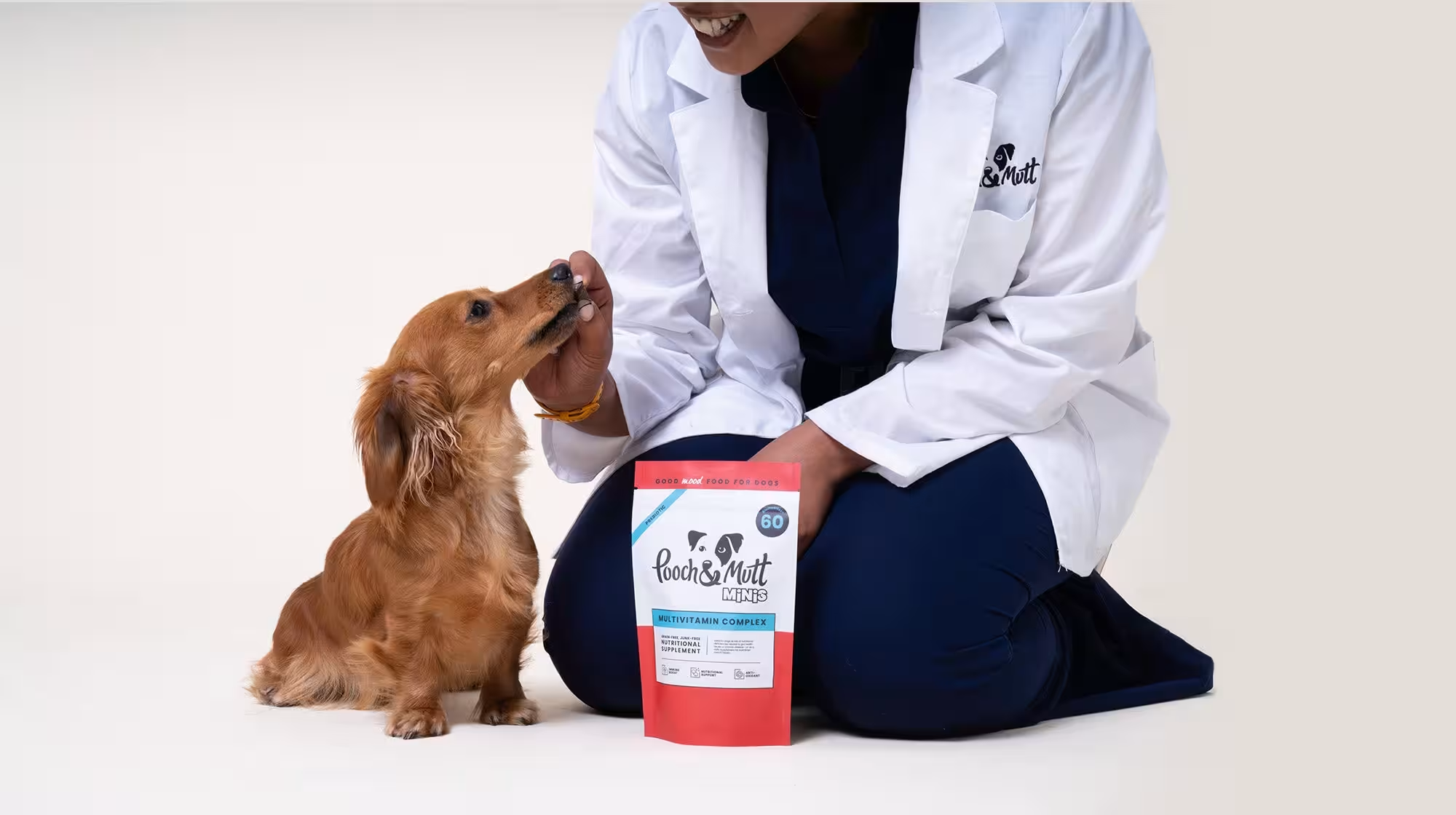In the last five years or so, I have had a huge surge in clients asking me how to improve dog gut health naturally. They’re beginning to hear all about the gut microbiome, and they want to do what they can to ensure their dog has the right balance of good bacteria.
This article looks at some of the health conditions linked to the gut, how dog owners can go about investigating their dog’s gut health and how dog gut health supplements and food can support your dog from the inside out.
 Gut Health
Gut Health
How the microbiome affects your dog’s health and well-being
There is a wide range of signs associated with an unbalanced gut microbiome, or dysbiosis, including:
Flatulence (farting)
Bloating
Constipation
Diarrhoea
Allergies
Cognitive impairment
Autoimmune disease
When gut health is out of kilter, changes in your dog can be insidious and may not be immediately obvious. Though an imbalanced microbiome, or dysbiosis, may not instantly cause symptoms, it could be an indicator of problems to come, making early intervention crucial.

What symptoms can dysbiosis cause?
Dysbiosis affects the body in many different ways. As well as gastrointestinal signs, you may see symptoms that affect your dog in other ways. Some of the more common signs seen include:
Bloating and flatulence
Chronic vomiting or diarrhoea
Low energy
Allergies
Joint disease
Reduced appetite
Behavioural issues or anxiety
With such an impact on their overall health and well-being, and many processes that contribute to their vitality, it’s always important and beneficial to investigate their gut health.

Why should I investigate my dog’s gut health?
Gaining insight into our dog’s gut health is now super easy.
We can test our dog’s gut health with a simple Gut Health Test , which is hugely exciting.


Gut Health Test
Get your results in 4 weeks, with our quick and easy, at-home Gut Health Test for dogs. One simple poo sample, analysed by our microbiologists, and you’ll get personalised recommendations to help your dog thrive.
*This item is excluded from all discount codes.
-
Science backed gut health insights
-
Online report including key health indicators
-
81% saw an improvement in their dog's health
Current price: £69.99
Gut Health Test
By identifying any issues, we can intervene, potentially preventing long-term health implications.
Similarly, maintaining optimal gut health in the long term can help keep our dogs robust and healthy well into their old age.
These tests can highlight the health of their gut, and the balance, richness and diversity of the bacteria living in their microbiome. This way, you can know what your dog requires in terms of diet and pre, pro and postbiotic supplements.
How can a dog’s diet help their gut health?
There is no one-size-fits-all when it comes to the complex world of canine nutrition. What your dog needs will depend on a range of factors, including their age, breed, underlying medical issues and general gut health.
You will want to offer a food containing prebiotics, as these are the fuel sources that nourish the good bacteria. As well as this, look for gut flora stabilisers, which inhibit the growth of pathogenic bacteria. Bionic Biotic is a great option here; a powder that can be added to any meal.


Bionic Biotic
A gentle, easy-to-use probiotic powder for dogs, designed to support digestive health and maintain a balanced gut. Perfect for puppies and adults, this dog probiotics formula helps promote overall wellbeing and comfort.
-
Aids digestion
-
Antioxidant rich
-
Money back guarantee
Current price: £10.99
Bionic Biotic
Opt for diets that use whole food ingredients and that include fruits or veggies. Steer clear of offerings that contain unnecessary additives, such as artificial colours or flavours.
The right diet is not only going to support optimal gut health and help prevent dysbiosis, but it can even reverse pre-existing imbalances and alleviate pesky symptoms.
Depending on your dog’s needs, you may opt for something like Pooch & Mutt’s Health & Digestion , Sensitivity , or the Single Protein Salmon Food . Or, for those on a wet or mixed diet, you could consider the Health & Digestion wet food or Fish, Potato and Pea wet food .
How do supplements help your dog’s gut health?
Supplements work alongside the diet to support the gut in a holistic fashion. Let’s take a closer look at some of the most common, beneficial ingredients.
Inulin is a prebiotic fibre that supports the growth of healthy bacteria.
Probiotics used for gut health in dogs include Bacillus subtilis, Lactobacillus acidophilus and Lactobacillus helveticus. They are the ‘good bacteria’ that we want to thrive.
Marshmallow Root is used for both its anti-inflammatory and antioxidant properties. This ingredient helps to soothe and calm an inflamed intestinal wall.
Thyme is an aromatic that has been used medicinally for many centuries, and is known to have both antiviral and antibiotic properties.
Quercetin may modulate the microbial diversity and richness within the gut, as it promotes the growth of desirable strains like Bifidobacteria and Lactobacilli, and reduces the growth of pathogens.
Echinacea has natural anti-inflammatory properties and promotes a robust immune system.
Supplements
Natural supplements and vitamins for dogs packed with active ingredients to help provide optimal health.
-

 from
fromCurrent price: £11.49
Salmon Oil For Dogs -

 from
fromCurrent price: £15.99
Dental Powder For Dogs -

 from
fromCurrent price: £10.99
Mobile Bones For Dogs -

 from
fromCurrent price: £10.99
Bionic Biotic -

 from
fromCurrent price: £69.99
Gut Health Test -

 from
fromCurrent price: £18.99
Gut-Skin Support Supplement -

 from
fromCurrent price: £14.99
Joint Tablets For Dogs -

 from
fromCurrent price: £19.99
Hemp Chewies -

 from
fromCurrent price: £18.99
Gut Detoxifier Supplement -

 from
fromCurrent price: £18.99
Multivitamin Complex Supplement -

 from
fromCurrent price: £18.99
Fibre Support Supplement -

 from
fromCurrent price: £18.99
Immunity Support Supplement -

 from
fromCurrent price: £23.99
Microbiome Support Supplement -

 from
fromCurrent price: £18.99
Gut-Joint Matrix Supplement -

 from
fromCurrent price: £35.99
Gut and Skin Itch Essentials -

 from
fromCurrent price: £35.99
Joint Health and Inflammation Bundle -

 from
fromCurrent price: £5.99
Calm & Relaxed Bone Broth -

 from
fromCurrent price: £5.99
Health & Digestion Bone Broth
Summary
If you’re wondering how to improve dog gut health, we now know that we want to be proactive rather than reactive. This is what makes investigating and maintaining good gut health for your dog, so beneficial.
Only recently have tools, like those at Pooch & Mutt, become available to allow us to get a glimpse into the population within our dog’s gut, enabling us to tailor a diet and supplement program to their specific needs.
Through simple dietary changes, you can not only intervene and correct an unhealthy gut, but you can also maintain optimal gut health for your dog’s whole life.
Given how impactful the gut is when it comes to both physical and mental health, this has the potential to be life-changing for some.
FAQs
How do I tell if my dog has poor gut health?
In the early stages, your dog may not have many (or any) obvious signs. However, as time goes on you may notice symptoms ranging from stomach upset or itchiness to joint pain and behavioural issues. The best way to see a clear view of your dog’s gut health is through a Gut Health Test .
How do I reset my dog's gut health?
Dietary adjustments are key when it comes to resetting the microbiome. This will include both their everyday diet and the use of supplements. Opt for foods containing both pre and probiotics, such as these yummy fish treats.





